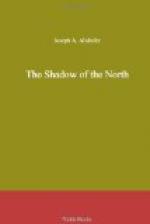Willet was the pervading spirit of the defense. Deft in word and action, acknowledging at all times that Colden was the commander, thus saving the young Philadelphian’s pride in the presence of his men, he contrived in an unobtrusive way to direct everything. The guards were placed at suitable intervals about the palisade, and were instructed to fire at anything suspicious, the others were compelled to stay in the blockhouse and take their ease, in order that their nerves might be steady and true, when the time for battle came. The cooks were also instructed to prepare an unusually bountiful supper for them.
Robert was Willet’s right hand. Next to the hunter he knew most about the wilderness, and the ways of its red people. There was no possibility that the Indians had gone. Even if they did not undertake to storm the fort they would linger near it, in the hope of cutting off men who came forth incautiously, and at night, especially if it happened to be dark, they would be sure to come very close.
The palisade was about eight feet high, and the men stood on a horizontal plank three feet from the ground, leaving only the head to project above the shelter, and Willet warned them to be exceedingly careful when the twilight came, since the besiegers would undoubtedly use the darkness as a cover for sharp-shooting. Then both he and Robert looked anxiously at the sun, which was just setting behind the black waste.
“The night will be dark,” said the hunter, “and that’s bad. I’m afraid some of our sentinels will be picked off. Robert, you and I must not sleep until tomorrow. We must stay on watch here all the while.”
As he predicted, the night came down black and grim. Vast banks of darkness rolled up close to the palisade, and the forest showed but dimly. Then the warriors proved to the most incredulous that they had not gone far away. Scattered shots were fired from the woods, and one sentinel who in spite of warnings thrust his head too high above the palisade, received a bullet through it falling back dead. It was a terrible lesson, but afterwards the others took no risks, although they were anxious to fire on hostile figures that their fancy saw for them among the trees. Willet, Robert and Colden compelled them to withhold their fire until a real and tangible enemy appeared.
Later in the night burning arrows were discharged in showers and fell within the palisade, some on the buildings. But they had pails, and an unfailing spring, and they easily put out the flames, although one man was struck and suffered both a burn and a bruise.
Toward midnight a terrific succession of war whoops came, and a great number of warriors charged in the darkness against the palisade. The garrison was ready, and, despite the darkness, poured forth such a fierce fire that in a few minutes the horde vanished, leaving behind several still forms which they stole away later. Another of the young Philadelphians was killed, and before dawn he and his comrade who had been slain earlier in the evening were buried behind the blockhouse.




